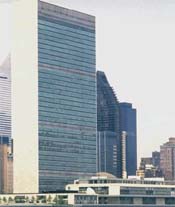 |


|
|
prior to UN AIDS Session 
AIDS Treatment News Dozens of organizations have called for a march and rally in New York on June 23, just before the United Nations General Assembly Special Session on AIDS (UNGASS). Some international delegates and organizers who have traveled to New York for the United Nations session are planning to join the march. Sponsors include the African Services Committee, Bailey House, Global AIDS Alliance (GAA), Health GAP Coalition, and ACT UP New York--in cooperation with NAPWA South Africa, and the Treatment Action Campaign (TAC) in South Africa. Endorsers include many other AIDS, international, and social-justice organizations. [Note: This is not to be confused with the June 3 march on the 20th year since the discovery of AIDS, which takes place in Washington.] This event is the same day as the NYC Dyke March, and one day before New York's Lesbian/Gay Pride parade. For more information, see http://www.stopglobalaidsnow.org United Nations: Civil Society Snubbed at Final Preparatory Meetings on AIDS By John S. James On June 25 - June 27 the United Nations will hold an historic special session on AIDS, often called UNGASS (United Nations General Assembly Special Session). Two preparatory sessions were scheduled to allow official delegates and civil society to interact; the last one was May 21-25. The United Nations also set up an email discussion list, Break the Silence, for organizations and individuals throughout the world to have their voices heard during the preparation for the Special Session. (At the June 25-27 official meeting it will be too late for significant changes and initiatives, as most of the outcome will have been set up in advance.)
The May 21-25 preparatory session was different. According to a May 24 press release by 12 organizations from the U.S., Canada, Venezuela, Ukraine, Brazil, UK, India, and Norway: "Many NGOs [non-governmental organizations, usually called nonprofits in the U.S.] traveled to New York from around the world, responding to the invitation of the President of the General Assembly, but found themselves unable to participate meaningfully or share their expertise with delegates, contrary to the General Assembly's own resolution which called for involvement of civil society in the development of a Declaration of Commitment to be signed by all 189 UN member states in June. While a handful of countries strongly supported civil society's contributions, two brief "dialogue" sessions - scheduled during the lunch and evening hours - went unattended by the majority of countries. Anand Grover from the Lawyers Collective HIV/AIDS Unit, Mumbai, India, said 'I am very disappointed at the absence of the delegates from countries who are most affected, their short attention span, and the lack of meaningful government participation.' "Yesterday the United States went so far as to ask all NGO representatives to leave the room, including those with ECOSOC accreditation who are normally entitled to observe country delegation negotiations. Since the US made a formal complaint, the Chair was forced to take the action, although he was perfectly willing to have the NGOs stay in room. 'This is a very bad precedent for the future and makes NGOs worry as to what will happen at the General Assembly itself,' said Carol Lubin, one of those who was ejected." The NGOs called on the United Nations to encourage member nations to include civil society and especially people with HIV or AIDS in their delegations, encourage member states to attend sessions they set up for dialog with civil society, and otherwise ensure that civil society can participate meaningfully in the process of developing worldwide programs for controlling AIDS. There is particular concern that some countries want to roll back human rights in general, and some do not want to acknowledge or even name vulnerable groups (such as men who have sex with men, injecting drug users, transgenered individuals, and sex workers) because of prevailing attitudes. Comment The fundamental problem, we suspect, is that any successful global AIDS program is likely to threaten powerful interests: big pharmaceutical companies (fearful about patent rights), some conservative religions (threatened by sex), and even part of "AIDS Inc." (concerned that momentum for other AIDS programs might damage theirs). We suspect that political problems like these are what has kept the world from dealing successfully with AIDS so far. It will be hard to negotiate among all the special interests that hold some degree of veto power over global progress against disease. AIDS Treatment News Published twice monthly Subscription and Editorial Office: 1233 Locust St., 5th floor Philadelphia, PA 19107 800/TREAT-1-2 toll-free email: aidsnews@critpath.org useful links: http://www.aidsnews.org/ Editor and Publisher: John S. James Associate Editor: Tadd T. Tobias Statement of Purpose: AIDS Treatment News reports on experimental and standard treatments, especially those available now. We interview physicians, scientists, other health professionals, and persons with AIDS or HIV; we also collect information from meetings and conferences, medical journals, and computer databases. Long-term survivors have usually tried many different treatments, and found combinations that work for them. AIDS Treatment News does not recommend particular therapies, but seeks to increase the options available. AIDS Treatment News is published 24 times per year, on the first and third Friday of every month, and print copies are sent by first class mail. Email is available (see below). Back issues are available at http://www.aidsnews.org/ To subscribe, you can call 800-TREAT-1-2 or 415-255-0588: |

© 1997-2002 BEI